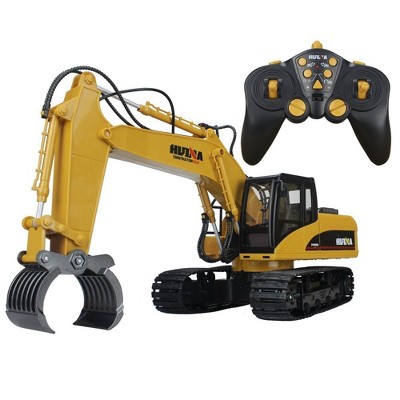Discover the Value of Excavator in Modern Construction Projects
Excavators are crucial devices in contemporary building jobs. Their versatility permits them to do a large range of jobs, from excavating and grading to demolition and site prep work. Advanced features, such as hydraulic accessories and general practitioners, enhance their abilities and performance on job sites. As the market advances, the value of excavators grows even a lot more. Understanding their function can expose understandings into the future of building and construction techniques. What exists ahead for these makers?
The Convenience of Excavators in Various Projects
Although excavators are usually linked with large-scale building and construction jobs, their convenience enables them to be made use of in a broad variety of applications, from household landscape design to utility upkeep. In metropolitan settings, excavators can navigate tight spaces to dig foundations for homes or install water drainage systems. Their capacity to execute delicate jobs makes them perfect for landscape design jobs, where they can excavate for ponds or plant trees. On top of that, excavators play a vital role in utility maintenance, efficiently digging trenches for pipelines or wires without disrupting bordering locations. In agricultural applications, they help in land cleaning and soil preparation. Their flexibility allows them to be furnished with various add-ons, improving their capability across different tasks. This diverse nature of excavators not just enhances numerous construction processes yet likewise shows their integral duty in contemporary infrastructure development and upkeep.
Key Functions and Kinds Of Excavators
The discussion on vital features and sorts of excavators highlights the vital features that make these machines invaluable in construction. Numerous excavator kinds, each created for particular tasks, demonstrate their flexibility and effectiveness throughout various applications. rc excavator. Understanding these classifications and functions is essential for optimizing their usage in modern building jobs
Excavator Keys In Introduction
Excavators play a crucial role in contemporary building, using flexibility and effectiveness throughout numerous tasks. These heavy equipment systems come in several types, each tailored for specific applications. The most typical types consist of crawler excavators, understood for their security on irregular surface, and rolled excavators, which supply higher mobility on smooth surface areas. Small excavators are preferred for small projects and tight areas, while long-reach excavators are developed for deep digging. Furthermore, there are specific excavators, such as hydraulic excavators, which enhance power and accuracy. Each kind includes one-of-a-kind abilities, making them vital for tasks ranging from digging and grading to demolition and material handling. Comprehending these variants enables construction professionals to pick the right excavator for their job needs.
Secret Features Explained
Understanding the crucial functions of excavators enhances their effective application in construction tasks. Excavators are identified by their effective hydraulic systems, which supply the necessary pressure for digging, lifting, and moving materials. Their verbalized arms permit a large range of motion, helping with accurate procedures in constrained rooms. Additionally, the selection of add-ons, such as containers, grapples, and augers, expands their convenience to satisfy different task requirements. The size and weight of excavators also add to their stability and ability to move on different terrains. Innovations in innovation have actually led to the assimilation of General practitioner and automation, improving accuracy and effectiveness in excavation tasks. These functions jointly place excavators as indispensable tools in modern building.
Applications in Construction
Changing building sites, excavators play an essential duty across different applications, varying from domestic structure jobs to large infrastructure advancements. These functional machines are geared up for jobs such as digging structures, trenching for utilities, and website grading. Different types of excavators, consisting of spider, wheeled, and mini excavators, give particular advantages tailored to the job demands. Spider excavators succeed in harsh surfaces, while rolled excavators supply flexibility on paved surfaces. Small excavators are excellent for restricted rooms, making them popular in metropolitan settings. The efficiency and power of excavators substantially speed up construction processes, making certain timely project completion. Their adaptability additionally improves their relevance, permitting building and construction teams to tackle a diverse array of challenges successfully.
Enhancing Effectiveness and Performance on Work Sites
Making the most of effectiveness and productivity on task sites is a crucial objective in modern-day building. Excavators play a pivotal role in attaining this goal by streamlining various tasks. Their capability to perform multiple features-- such as grading, digging, and training-- decreases the need for additional devices, therefore conserving time and resources.Moreover, excavators enhance workflow by enabling faster completion of projects. With sophisticated functions like hydraulic accessories and general practitioners innovation, they can carry out precise procedures that decrease mistakes and rework. This precision not just enhances the quality of job but additionally enhances material usage, adding to set you back savings.The adaptability of excavators permits them to adapt to different site problems, making sure that tasks progress efficiently no matter of obstacles. By integrating excavators right into building and construction processes, teams can significantly enhance their general productivity, bring about prompt job completion and raised productivity.
Security Benefits of Making Use Of Excavators
Excavators greatly enhance safety and security on construction websites through boosted operator presence and decreased manual work threats. By offering drivers with a clear view of their environments, excavators assist to stop injuries and crashes. Additionally, the equipment decreases the demand for workers to take part in dangerous hand-operated jobs, even more advertising a much safer workplace.
Enhanced Driver Visibility
Building sites can be chaotic and filled with potential dangers, enhanced driver exposure plays a vital duty in making certain security when making use of excavators. Modern excavators are made with big, unblocked home windows and tactically placed mirrors, permitting operators to preserve a clear view of their surroundings (rc excavator). This enhanced visibility is important for spotting pedestrians, various other machinery, and numerous challenges, substantially minimizing the risk of mishaps. In addition, lots of excavators include sophisticated technology, such as video cameras and sensing units, to offer operators with added point of views, even more improving awareness. The ability to see even more clearly not only help in effective procedure but likewise cultivates a more secure job environment, making it much easier for drivers to browse complicated building websites without compromising security criteria
Minimized Handbook Labor Dangers
When hand-operated labor is reduced with the usage of excavators, various safety and security benefits emerge, noticeably improving the well-being of building and construction workers. Excavators reduce the physical pressure associated with hefty training and recurring tasks, properly reducing the threat of bone and joint injuries. By automating procedures such as digging, grading, and relocating materials, they allow employees to preserve a much safer distance from prospective hazards. Additionally, excavators are outfitted with advanced safety functions, such as rollover protection systems and improved driver comfort designs, which additionally guard workers on site. The result is a substantial reduction in office mishaps and injuries, causing boosted performance and spirits among building teams. Ultimately, the adoption of excavators adds to a safer and extra efficient building and construction atmosphere.
Excavators in Earthmoving and Site Preparation
In modern-day construction, a significant section of earthmoving and site preparation tasks relies on the effectiveness and flexibility of excavators. These equipments are made to handle numerous dirt types and terrain, making them indispensable for rating, digging, and trenching activities. Their hydraulic arms can be outfitted with various add-ons, such as augers and pails, allowing operators to customize their strategy based on certain project requirements.Excavators excel at moving large quantities of planet rapidly and effectively, which increases the overall building timeline. They can navigate tight spaces and challenging websites where conventional equipment might struggle, enhancing efficiency. In addition, the precision of excavators assurances that website preparation sticks to rigorous specs, minimizing the risk of mistakes that could lead to costly rework.
The Function of Excavators in Demolition Tasks
Excavators play an important role in demolition tasks, as they have the power and dexterity needed to take apart frameworks efficiently. Geared up with numerous add-ons such as hydraulic breakers, shears, and grapples, these machines can adapt to different demolition needs, whether for little structures or large commercial websites. Their flexibility makes it possible for drivers to tackle intricate tasks while maintaining security and precision.In addition to their demolition abilities, excavators facilitate debris removal, guaranteeing that job sites stay well organized and safe. By damaging down frameworks right into convenient pieces, they permit streamlined clearing up and recycling of products, lining up go to this website with modern sustainability efforts.Moreover, excavators can access tight areas and browse unequal surface, making them important in urban demolition tasks. In general, their durable style and multifunctionality make excavators a critical asset in the demolition phase of construction, contributing considerably to project timelines and efficiency.


Future Patterns in Excavator Modern Technology and Use
As the construction market develops, advancements in excavator modern technology are poised to transform their use and performance substantially. One substantial pattern is the combination of automation and expert system, allowing excavators to run with minimal human treatment. This change will certainly improve precision in jobs such as grading and trenching, lowering human mistake and enhancing productivity.Additionally, the increase of electric and hybrid excavators is forming a more lasting construction setting, lowering carbon emissions and fuel expenses. Enhanced telematics systems are likewise emerging, allowing real-time tracking of equipment efficiency and upkeep needs, which can bring about much better functional performance and longer tools lifespan.Moreover, improvements in attachment modern technology are increasing the convenience of excavators, enabling them to execute a wider array of tasks. The mix of these fads demonstrates a future where excavators are smarter, greener, and more versatile, eventually improving construction project dynamics.
Often Asked Inquiries
How Do Excavators Compare to Other Building Machinery?
Excavators, characterized by their adaptability and power, master excavating and earthmoving contrasted to various other equipment. Their capability to perform different tasks, consisting of lifting and demolition, makes them indispensable in construction jobs, improving general efficiency.

What Is the Average Lifespan of an Excavator?
The ordinary life expectancy of an excavator usually ranges from 7,000 to 10,000 operating hours, depending upon upkeep, usage conditions, and design. Proper care can extend this life expectancy, ensuring peak performance throughout its functional years.
How Are Excavators Maintained for Optimum Performance?
Excavators require routine maintenance for peak performance, including regular evaluations, fluid checks, filter replacements, and timely repair work. Executing a preventative upkeep schedule assists prolong their lifespan and guarantees efficient procedure in various construction environments.
What Are the Expenses Linked With Acquiring an excavator vs. renting?
The prices connected with buying an excavator versus leasing differ substantially. Renting out deals lower upfront expenses yet can gather gradually, while purchasing calls for a significant initial financial investment, however offers long-lasting cost savings and possession ownership advantages.
What Training Is Required to Operate an Excavator?
Operating an excavator needs specialized training, generally including security protocols, equipment operation strategies, and environmental recognition. Accreditation programs frequently mandate practical experience, allowing drivers to manage various jobs efficiently while making certain conformity with industry laws. The most typical kinds consist of spider excavators, known for their security on uneven surface, and wheeled excavators, which supply better wheelchair on paved surfaces. his response Mini excavators are preferred for small-scale jobs and limited spaces, while long-reach excavators are created for deep digging. Additionally, there are specialized excavators, such as hydraulic excavators, which enhance power and precision. Different kinds of excavators, including crawler, rolled, and mini excavators, moved here give specific benefits tailored to the project needs. Crawler excavators succeed in rough terrains, while wheeled excavators use mobility on smooth surface areas.